The Truth About Hair Loss and Scalp Health, Straight From an Expert

Hair loss is a topic that I have always been passionate about. While I've been fortunate enough to not experience it severely first-hand, I've seen loved ones go through the process and I realise how distressing it can be. Hair is very much tethered to our identity and how we choose to present ourselves to the world. It's not "just hair," and any concerns around your hair and scalp health are totally justified. Of course, you may choose not to have hair—to shave your lengths out of aesthetic preference or practicality—but for those who lose their hair involuntarily or suffer from a scalp condition, it can have a very real effect on their well-being. In my role as a beauty journalist, I get a lot of happiness from helping people find solutions, whether it be for a skin problem like eczema to addressing scalp concerns. If you're currently experiencing hair loss or scalp problems, or you just want to find out more about what might happen in a trichology appointment (and if they're really worth it), then you've come to the right place.
First and foremost, what's important to address is that hair loss in itself is a hugely broad topic. So much so that entire books are written about it. Hair loss is unique to everyone and is commonly out of their control. It could be down to a number of factors: genetics, pregnancy, illness, diet, or something else altogether. As such, everyone's solutions and treatment may look very different. What works for one person might not necessarily work for you.

For that reason, I'd urge anyone concerned with hair loss or other scalp-related ailments to book in with a trichologist—someone who specialises in the subject—if your budget allows for it. Not only will you cut out the guesswork of what products actually work (and will work for you specifically) but you'll most likely save time and energy down the line. Because there is nothing more frustrating than spending a lot of money on products that won't do what they promise to on the label.
I have always experienced an irritated scalp and had started to notice some hair thinning around my temples. So, I visited the Philip Kingsley clinic in London to speak with consultant trichologist and hair expert, Laura Fowles. During our session, I had a full consultation to further understand how to best treat hair loss and improve my scalp health, as well as understand what might be the root cause of hair loss. Below is everything I learnt in my trichology appointment, as well as some guidance to consider if you're experiencing hair loss right now.
Diet plays a key role in hair and scalp health
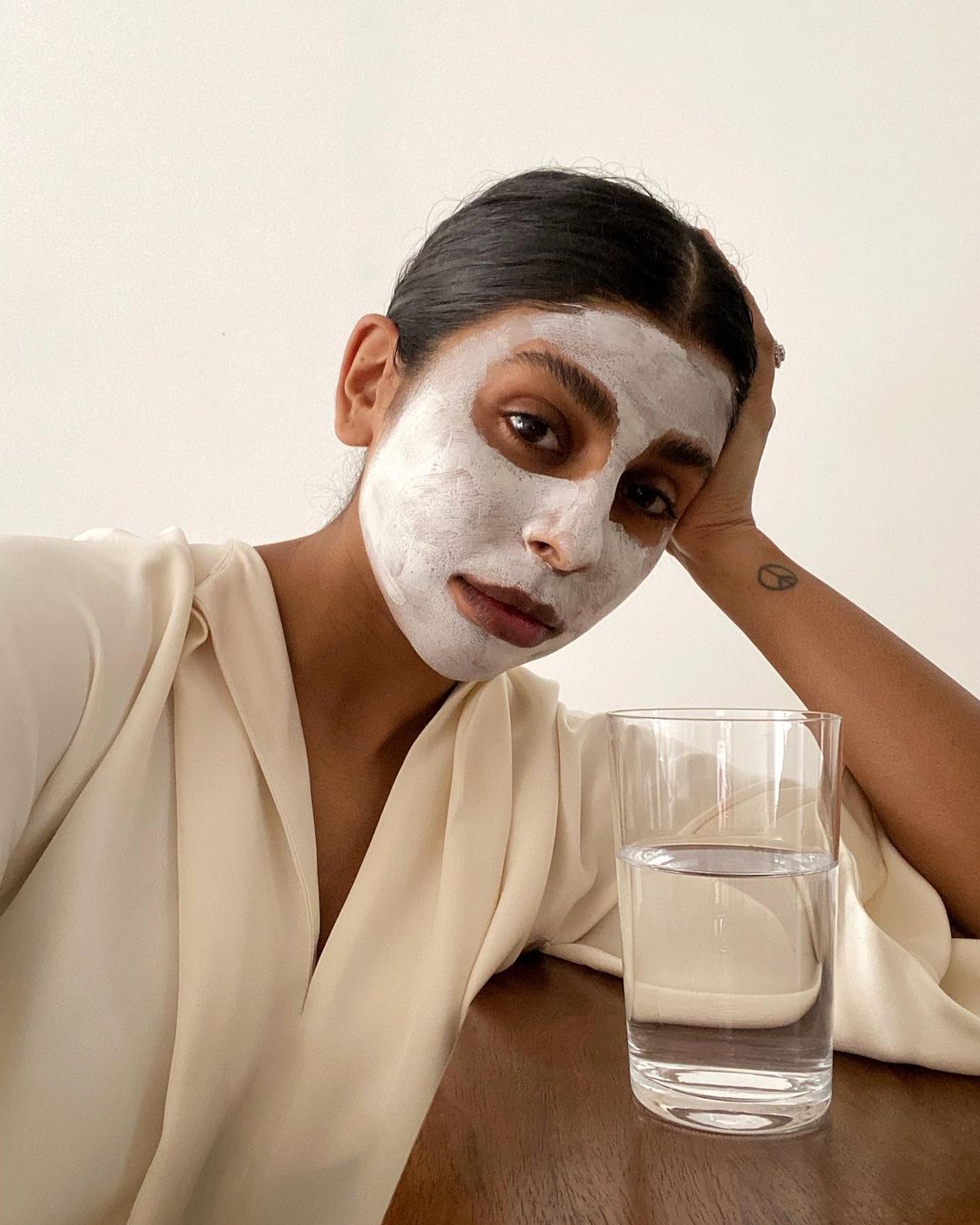
"Our scalp and hair health can be affected by our diet," says Fowles. "There is a lot of things that can affect our skin, hair and scalp, some we can't control, but diet is something that we can." Much like some people experience skin issues when eating certain foods, the same thing can happen to our scalp—it's just another extension of our skin. Again, this will vary from person to person. For me, I often experience eczema so Fowles ran through my diet. "Dairy, lots of sugar, white wine or champagne can sometimes be triggers," says Fowles. We also discussed how much I eat tomatoes and mushrooms, as these can also be triggers for people when eaten regularly. During the consultation, I realised I was probably eating too much sugar. If you suspect something you eat might be causing your scalp issues, then Fowles recommends reducing or briefly eliminating said food to see if you notice an improvement.
As for hair loss, diet plays an equally important role. "Your hair is the second fastest dividing cell in the body," continues Fowles. However, our body doesn't consider our hair as an essential tissue, so it won't be prioritised if we're not getting enough of the right things or energy in our diet. And it's not just about what we're eating, but when. "Eating breakfast is really important, as well as having snacks in between meals to top up your energy," she says. Our hair demands a lot of energy to grow, so eating regularly is key. As for what is good to eat, Fowles suggests eating a form of protein with every meal (but particularly in the mornings and at lunchtime); eating fish and complex carbs which will release energy slowly throughout the day are recommended.
If you're vegetarian, vegan or avoid anything in particular in your diet, you'll also want to ensure you're getting enough protein and omegas into your diet, possibly supplementing in vitamins or minerals you might be lacking in. However, Fowles notes that even if your diet is perfectly balanced, some people's blood tests will show deficiencies and, sometimes, those with less-than-perfect diets will have very healthy blood results. "It's about what we absorb from our food too, and this can vary" she notes. This could be down to stress, medication and various factors. Consulting with a trichologist will help you understand where you might be lacking and the best way to boost your levels.
During my appointment, it was recommended I undergo a blood test to review my ferritin (the storage of iron in the body) as Fowles suspected that this could be a cause of the hair thinning around my temples. After receiving my blood test results, I was indeed low on ferritin, as well as vitamin D and folic acid. So, Fowles recommended some supplements for me to take for the next three months, where I'll hopefully see my levels improve. As part of my consultation, I also received a helpful dietary guide with meal and snack suggestions to give my hair the best nutrition possible.
A trichologist can spot scalp issues that can be misdiagnosed
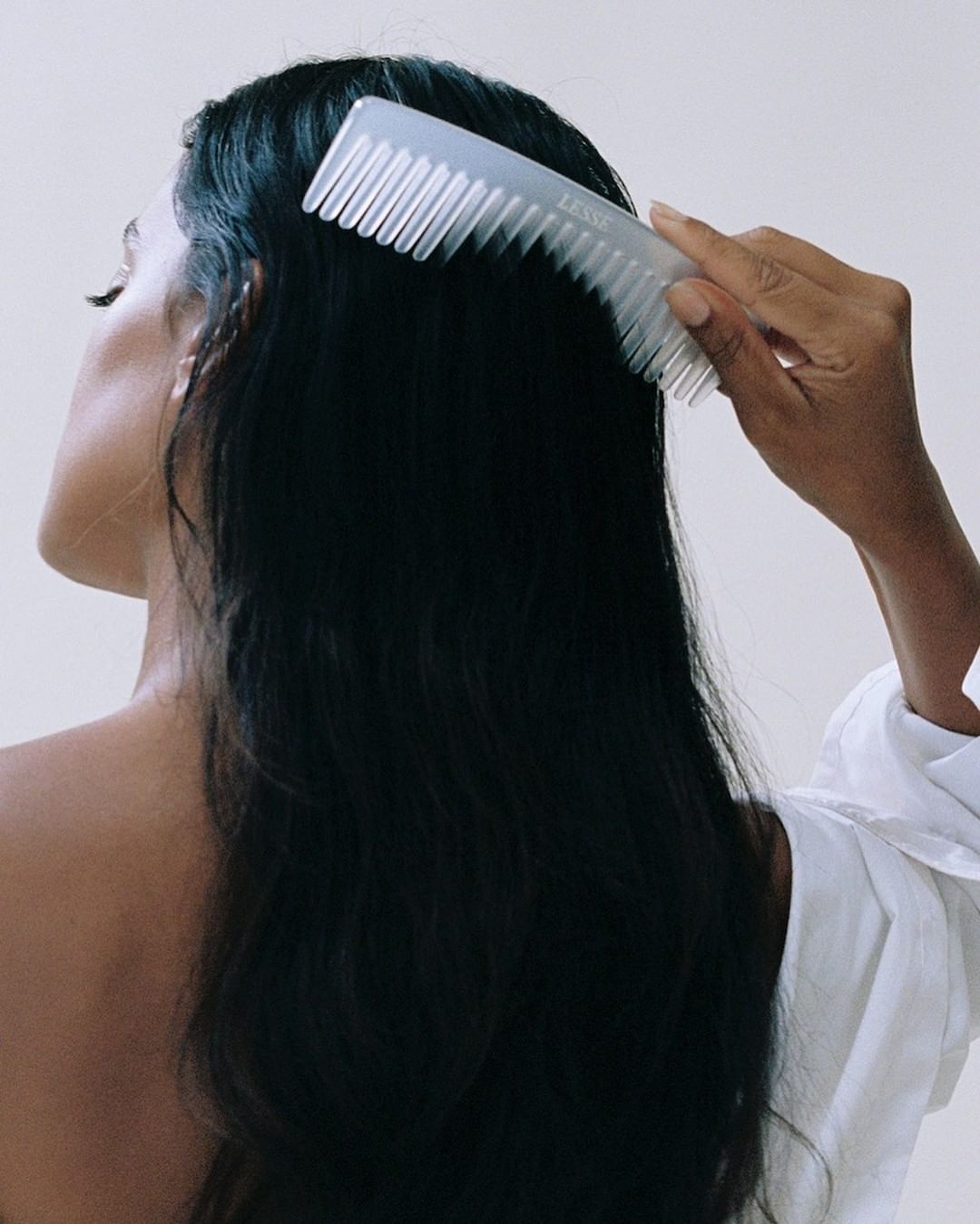
One of the aspects of the Phillip Kingsley consultation I was most looking forward to was the scalp analysis. At the clinic, the trichologists use a magnifying device which allows the practitioner and patient to see the scalp and hair up close and personal. The camera zooms in so you can see the hair density across your head, as well as any areas of inflammation or irritation. Fowles compared it to looking at a "forest," and it's kind of fascinating.
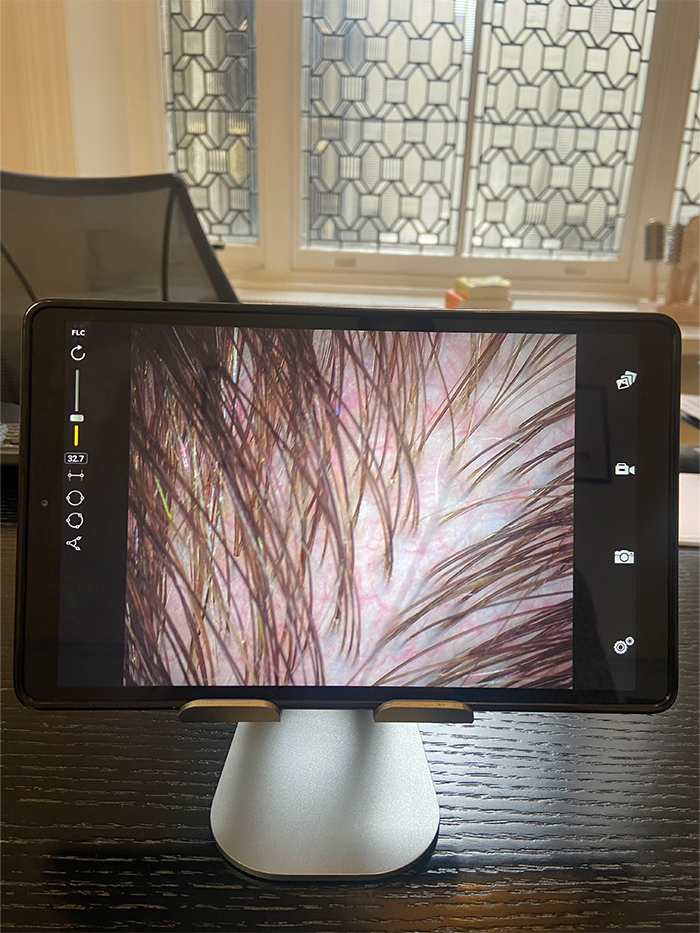
My scalp magnified under Phillip Kingsley's magnifying camera.
I've always had an irritated scalp and have experienced dandruff, and I was also diagnosed with some areas of psoriasis a couple of years ago. Now, Fowles believed this may actually be sebheorric eczema. As I often experience eczema elsewhere, we began connecting some dots and I was recommended a couple of Phillip Kingsley products to treat this at home. Additionally, I also experienced a scalp treatment in the clinic, which is basically like a deep-cleanse facial for the scalp. My trichologist applied a cooling mask to my roots, followed by a scalp massage to dislodge buildup before using a device to physically remove flakes from the patch of sebheorric eczema. Once I had emerged from the spa-like treatment, my scalp felt incredibly clean and comfortable. And I was leaving with extended knowledge of which hair products would actually help my scalp and hair's needs. We're all guilty of self-diagnosing (I certainly had done so with my scalp concerns), but having an expert give a correct assessment means I'm now better equipped to manage it going forward. Win-win.
Genetics can have a huge influence on our hair
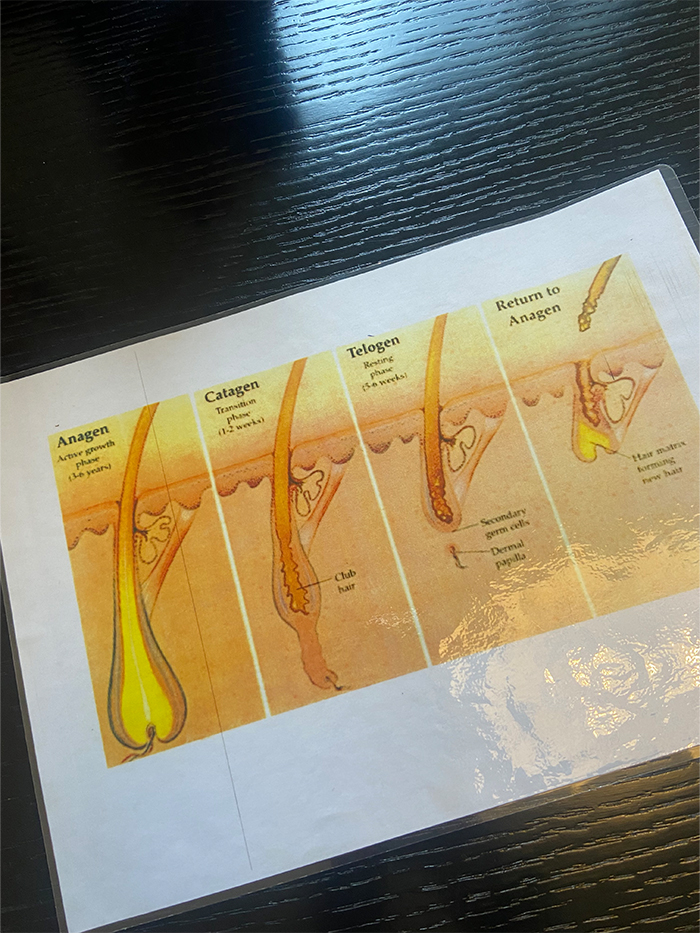
A diagram which shows the life cycle of the hair follicles on our head.
I knew that our genetics could play a role in how our hair develops over time. During my consultation with the trichologist, I was surprised to learn that even our grandparents' hair can influence our own, both on the maternal and paternal sides, and it's not strictly down to gender either. My mum and dad still have good hair into their sixties, however, my grandfathers on both sides of my family have experienced hair loss. Fowles says that this can play into how my hair develops. And while it's not anything to worry about imminently, it has armed me with the knowledge to keep an eye on my hair down the line and be aware of any changes. "If you were to see changes, there is still treatment that we can do for that," says Fowles.
What causes genetic hair loss in men and women is often down to the genetics that are passed down which affect our hair's receptors to the testosterone hormone. Often, testosterone gets the blame for causing hair loss when, in fact, it's how sensitive our body's receptors are to it, not the amount of testosterone itself. Still, Fowles notes that hair changes due to this happen very slowly over time, and won't be overnight. So it's something to keep an eye on rather than worry about too much. If you do experience changes, book in with a trichologist who can discuss the best course of treatment for you.
A trichology appointment is an investment in your hair health
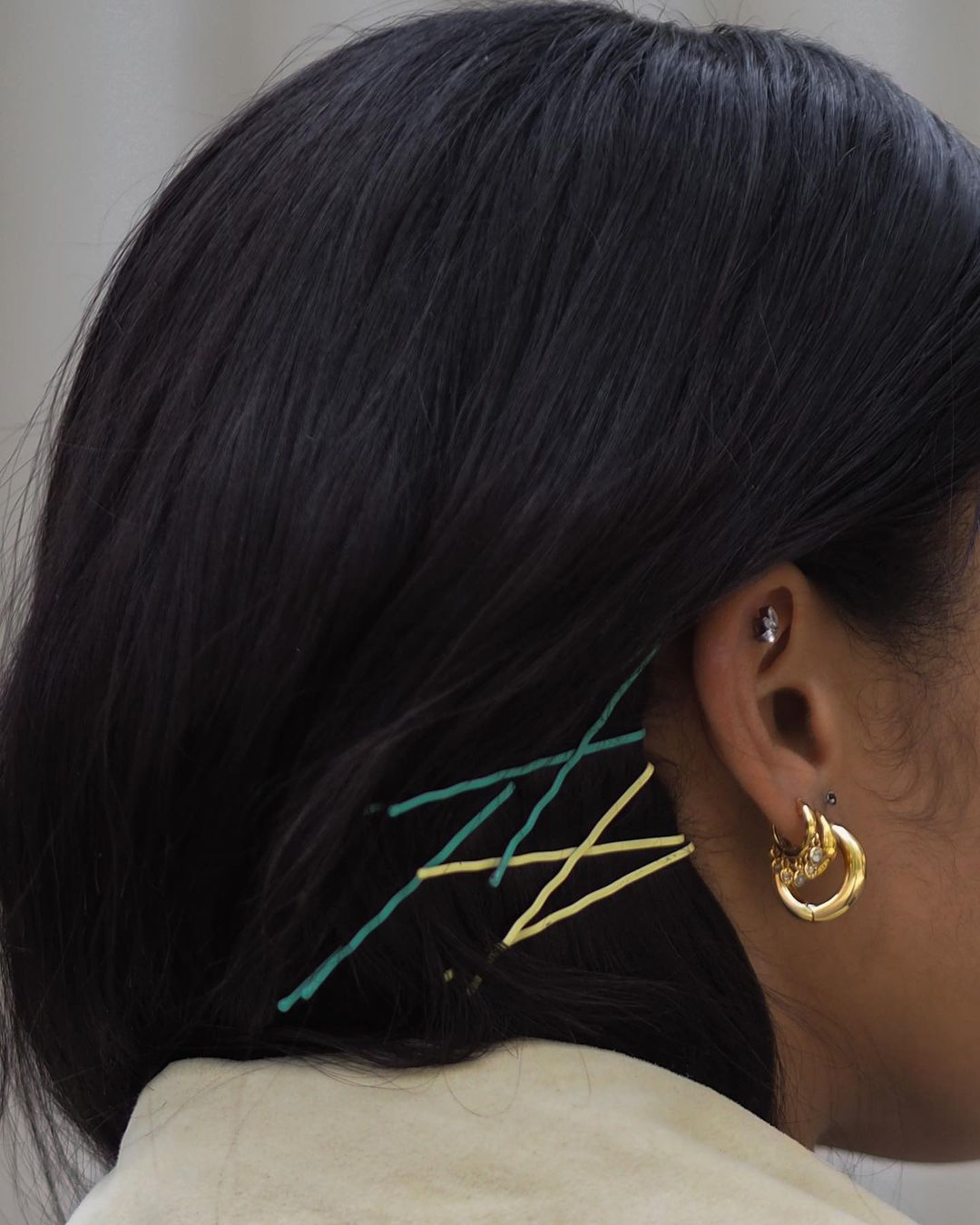
A trichology appointment can be a significant investment, and if it wasn't for having the opportunity to write about the consultation, I'll be transparent, I would have to weigh up the cost and consider it carefully. That being said, there is such much value that I have gained from my appointment. I'm also a big believer that you could easily fork out money on supplements and shampoos that promise the world but won't (and don't) give you the results that you're after, just as I have with the number of products I've bought over the years to treat my scalp. That's a lot of time and money that's potentially gone down the drain; you may be better off putting the money aside towards an appointment with a trichologist instead. Not only do you get targeted advice that is personalised to you, but it also sets you on the right path of treatment and pinpoints products that will actually work.
If you're not able to make it to an in-clinic consultation, or can't currently afford an appointment at a trichological clinic, Phillip Kingsley is now offering virtual trichological services which are more accessible than the in-clinic sessions, and is offering them at an introductory offer of £95—a significant saving compared to the in-clinic consultations. The process is simple: You fill out a form, choose your appointment time and date, and then send in pictures and details of your hair and/or scalp concern. If needed, there is also an option to do at-home blood testing should you need it.
Regardless of where you're at in your hair- and scalp-health journey, talking with an expert could be a positive step towards finding the right path for you.
Up Next: Worried About Hair Loss? These Are the Products That Are Always Recommended
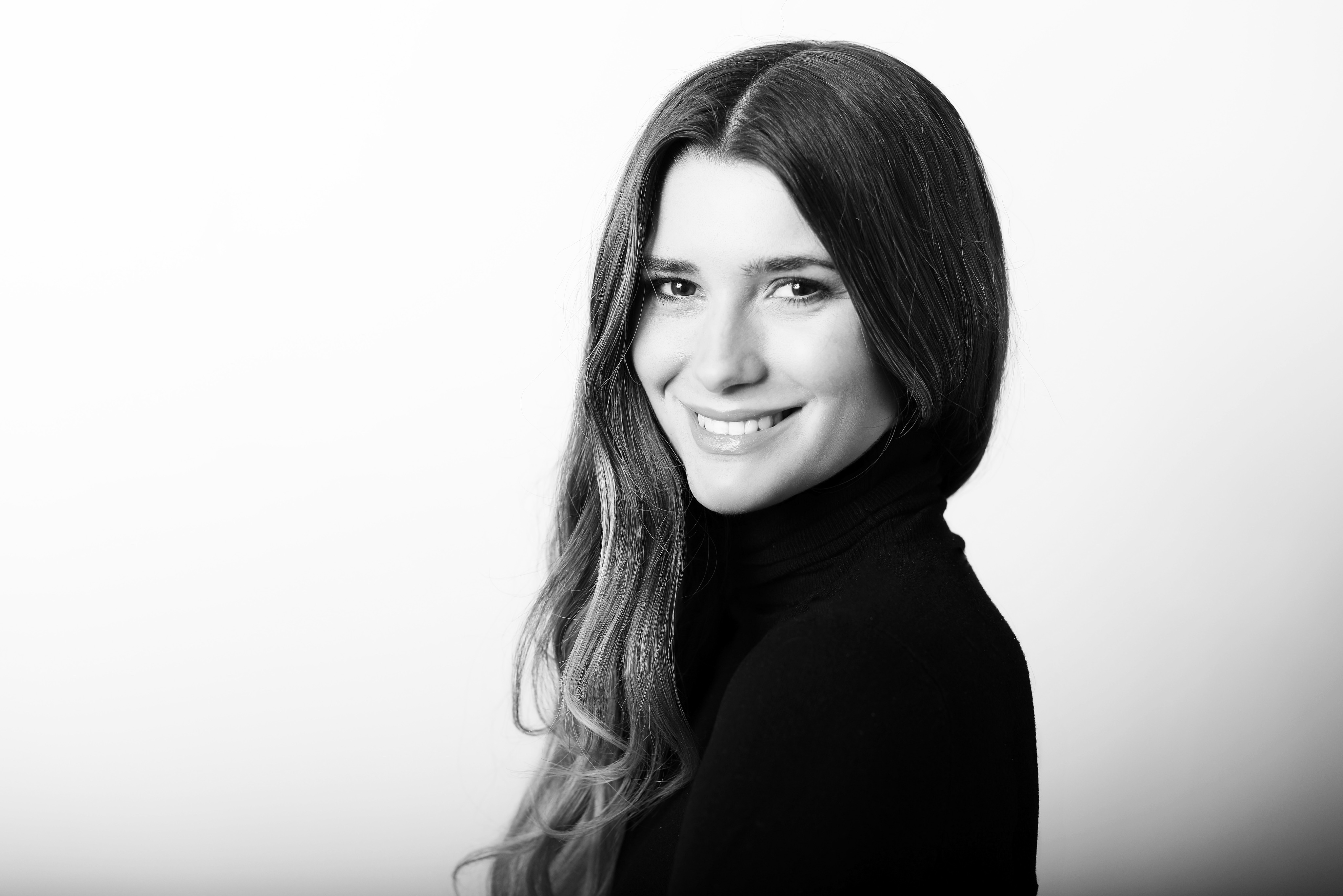
Eleanor Vousden is the beauty editor for Who What Wear UK. She was previously deputy editor at Hairdressers Journal, health writer at Woman
Home and junior beauty editor at Powder. She has also contributed to Wallpaper and Elle Collections.
With a degree in fashion journalism from the London College of Fashion, she has 10 years of industry experience and has been highly commended at the BSME Talent Awards for her work on Powder and also contributed to the title winning Website of the Year at the PPA Awards.
Eleanor’s journalistic focus is providing readers with honest and helpful beauty content. She has interviewed celebrity makeup artists, hairstylists and dermatologists throughout her career, as well as celebrities such as Hailey Bieber, Sarah Jessica Parker and Scarlett Johansson.